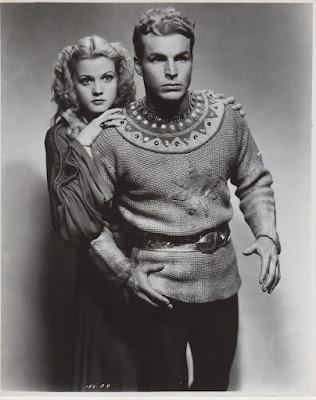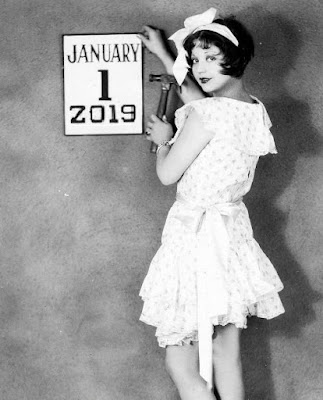Starring: Buster Keaton, Jimmy Durante, Thelma Todd, Ruth Selwyn, Sydney Toler, and Henry Arnetta
Director: Edward Sedgewick
Rating: Six of Ten Stars
A bookish professor (Keaton) gets news that he has inherited $700,000, and he decides it's time to live his life to its fullest. While on his way to New York, he encounters a struggling theatre troupe with more heart than talent. He become smitten with Pansy, the lead dancer (Selwyn), and he decides to be their financial backer for a Broadway show.
"Speak Easily" is a very uneven comedy that is dragged down by long stretches of unfunny or repetitive gags separated by some excellent bits. It's got a solid and talented cast that deserved better than the material they have to work with.
For example, poor Buster Keaton is the star of the film, but he still has very little do. He is more frequently than not relegated to the role of straight man to Jimmy Durante, and most of the bits he has of his own are dragged out past the point of being funny. As for Durante, he, too has to struggle with routines that drag on; there's a bit involving luggage that starts out amusing and grows tiresome and annoying by the time the film finally moves on.
The one performer in the film who gets to appear in all the films best scenes is Thelma Todd, and it's in these scenes were Keaton gets to shine his brightest, too. Todd shows up in the second act, and she is the closest thing this genial story has to a villain. Her character, Elanor, is a burlesque dancer who is willing to do almost anything to get a part in a Broadway play, from stripping down to her underwear at the slightest suggestion--which immediately convinces Durante's character, James, that she has what it takes to be in the show--to setting up Keaton's Professor Post to be blackmailed for sexual indiscretions. Unfortunately, the good professor is simply too oblivious to even realize that Elanor is trying to seduce him, and her big scheme backfires when her efforts end up with both of them so blindingly drunk the couldn't be "indiscreet" if they wanted to.
This drunken scene, and its aftermath, with Keaton and Todd features a hilarious mix of spoken and physical humor and it is the highlight of the movie. In fact, the story-thread that starts with Elanor showing up in the Professor's office, through her attempts to seduce him and blackmail him, through the steps that James takes to extract him from any possibility of scandal, is so sharp and so well-done that it feels like it belongs in a much better movie. These scenes show that it wasn't that the famed silent movie star Keaton was getting old and had lost his edge (as some claimed at the time... and perhaps even today); it was that he didn't have anything good to work with. With quality material, and partner that can give as well as she got--which he had in Todd in these scenes they did together--Keaton could still deliver the physical humor that had made him famous, as well as deliver spoken jokes with perfect timing and the driest of dry wit.
While Keaton also has a few great moments toward the end of the film--during a Broadway opening that's bound to be a disaster unless some miracle happens--the scenes he shares with Todd really are the film's high point. It's really a shame that the rest of the cast is stuck with mostly sub-par material,. because there are several instances where they show that they are all quite talented. Nowhere is this more clear that the scene where Professor Post decides to bring the troupe to Broadway. The performance they put on is such a wretched display of hammish acting, lousy singing, and bad choreography that leaves viewers in awe at how bad it is... which is proof that we are watching performers of the highest caliber. It takes a lot of skill, and even more practice and rehearsal, to be as bad as they are in that scene.
It's at once heart-breaking and touching that Professor Post is so smitten with the troupe's leading later that he can't see how bad Pansy and her fellow performers are... and it also gives Jimmy Durante's character a likable dimension to what otherwise comes across as a fairly wretched human being: James truly believes that he and his troupe could be the next big thing if only they could get a break. When the Professor offers to fund their show, James isn't motivated by greed, but rather by the excitement of making his (and his fellow actors) dreams come true and to get them the recognition he believes they so richly deserve. At no point does James's faith in his troupe waver, even when the experienced Broadway director that Professor Post hires (played by Sydney Toler, who is best known as Charlie Chan) accurately and truthfully describes the level of talent the performers have. As annoying as I find Durante as an actor, I really liked his character of James... and I really wished he'd been given better material to work with.
(Of course, here I am laying blame on the scriptwriters and the director for the movie being mostly weak when maybe I should be giving credit to Buster Keaton and Thelma Todd for making the scenes they have together so sparklingly brilliant. After all, they are the common denominator for the movie's best parts... and their hilarious scenes together are plenty reward for sticking around through the rest of the film.




















.jpg)













.jpg)
